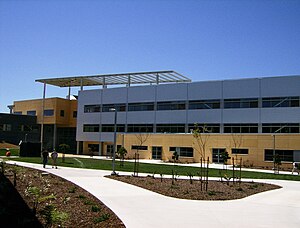Cal Poly San Luis Obispo College of Engineering

The Engineering IV Building
|
|
| Motto | Learn By Doing |
|---|---|
| Type | Public |
| Dean | Debra Larson |
|
Academic staff
|
230 (2015 Fall) |
| Students | 6,127 (2016 Fall) |
| Undergraduates | 5,847 (2016 Fall) |
| Postgraduates | 280 (2016 Fall) |
| Location | San Luis Obispo, CA, USA |
| Campus | Suburban |
| Website | www.ceng.calpoly.edu |
The Cal Poly San Luis Obispo College of Engineering is the engineering college of the California Polytechnic State University in San Luis Obispo, California. It has over 200 faculty members and more than 6,000 students enrolled in fourteen bachelor's and in eleven master's degree programs through nine engineering departments.
The College of Engineering is the largest of Cal Poly's six colleges, with 6,127 students (5,847 undergraduate and 280 graduate students) of the 21,306 enrolled at the university in Fall 2016. For engineering freshmen entering Fall 2016, Cal Poly accepted 23.0% of applicants (3,792 accepted/16,464 applied); admitted freshmen had an average GPA of 4.17, average ACT composite of 33, and average SAT composite score of 1450 (out of 1600) for reading and math. According to U.S. News & World Report's 2017 America's Best Colleges report, the College of Engineering is tied for the No. 5 ranking for undergraduate engineering schools in the U.S. whose highest degree is a Master's. Cal Poly San Luis Obispo offers 4+1 Master (5-year) programs for some engineering majors.
Students are prepared for engineering work related to aerodynamics, flight testing, structures, propulsion, control systems, vehicle dynamics, stability and control, flight simulation, and design for both fixed and rotary wing aircraft, missiles, and spacecraft.
The Aerospace Engineering program was ranked by U.S. News & World Report's 2013 America's Best Colleges report (includes both private and public universities) as #5 overall (of those engineering schools whose highest degree is a Master's).
The Bachelor of Science degree in Civil Engineering and Environmental Engineering emphasizes the study of engineering principles and the application of scientific knowledge and technology for the betterment of humankind. The program stresses the team design concept and systems approach to problem solving and is accredited by the Engineering Accreditation Commission of the Accreditation Board for Engineering and Technology (ABET).
...
Wikipedia
